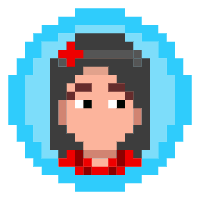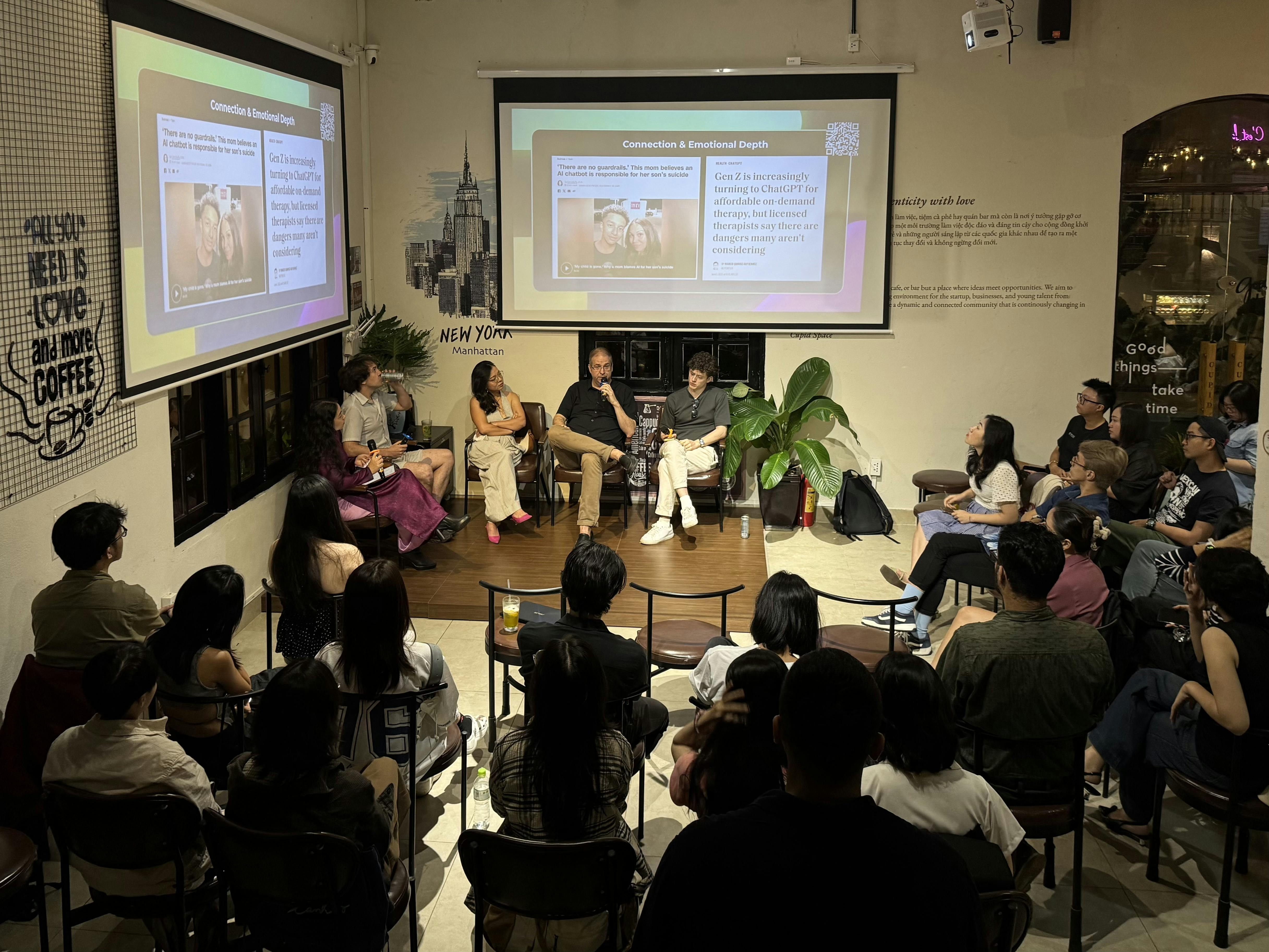HackerNoon was back with another event (so far - we've done San Francisco, London, Hanoi, and Saigon. The last event we did was 6 years ago already 😮 ) Thank YOU to our small but mighty team in Vietnam (Kien Dao & Tuan Anh 🙌), our support team (Dau, Huy, Tung, Fuong - you rock!), our awesome moderator (Vicky Giap - you are going far!), our panelists (Andrew Schwabe, Stephen Turban, my very own partner & HackerNoon CEO David Smooke), and of course, the 50+ audience members who showed up, asked questions, took notes, and all in all actually gave 2 f***s about the fate of humanity and what it means to be human in the age of AI.
Content aside, I think the medium of the event speaks for itself: what does it mean to be human? We show up. In person. Together. Through the rain, the awkward micro echos and the "hellos, how are you's, im fine thank you and you's", and all the frictions & beauty human interactions inevitably produce that no AI can come close to replace. 3 hours in, and I'm still craving for more.
Here are some of my personal reflections and notes on some of the biggest questions asked during the panel. Full video and event recap to be available on HackerNoon Youtube and social media soon.
Most people are neutral about AI - but more lean optimistic than pessimistic
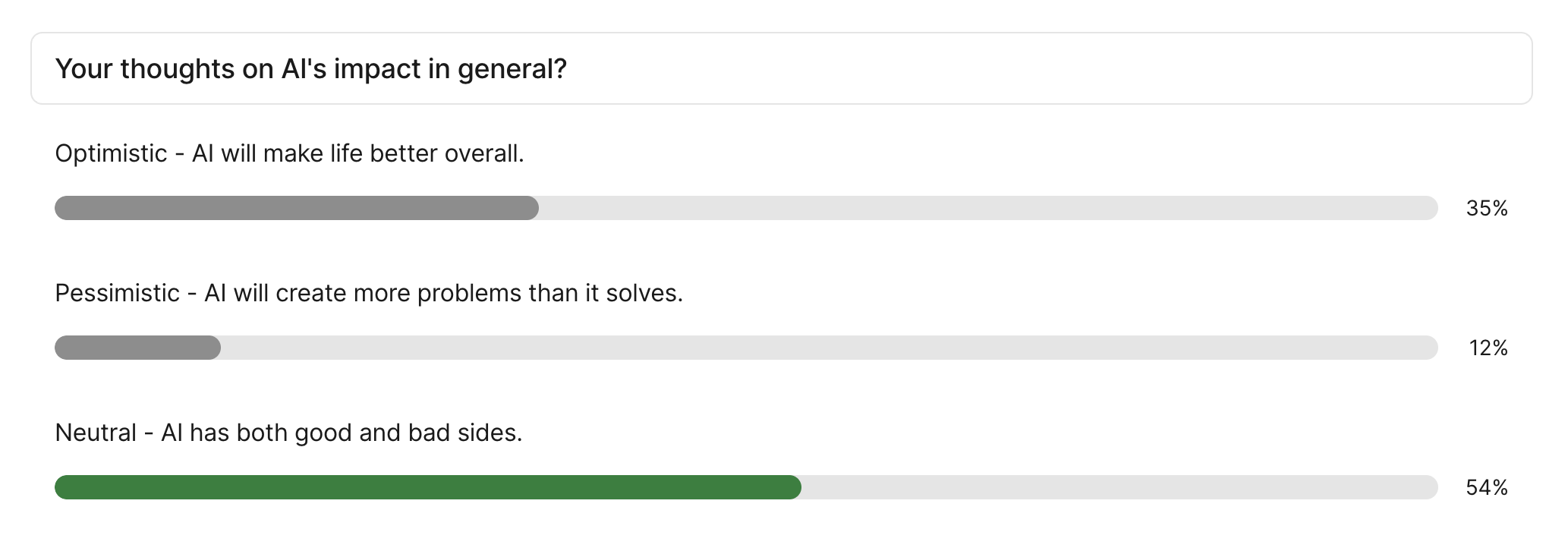
How do you use AI in your daily life: Brainstorm, Research, Ideation are the most common use cases
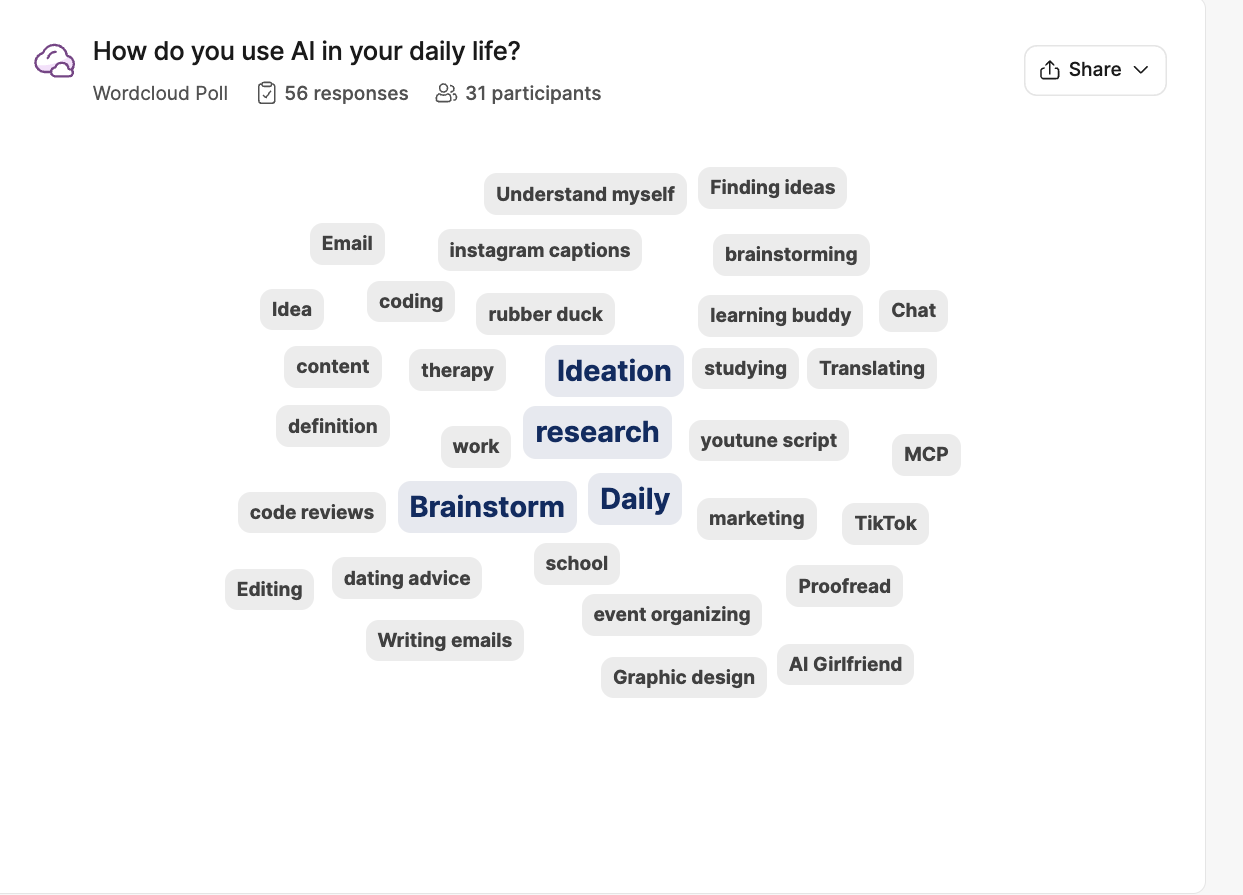
And now, for some questions asked
Our panel, which lasted 1.5 hours, answer 5 fundamental questions all regarding the big question of "How to preserve what makes us “human" in the age of AI?" Below are my answers from the panel, as well as, answers to the additional crowd questions which we didn't have time to address on the panel.
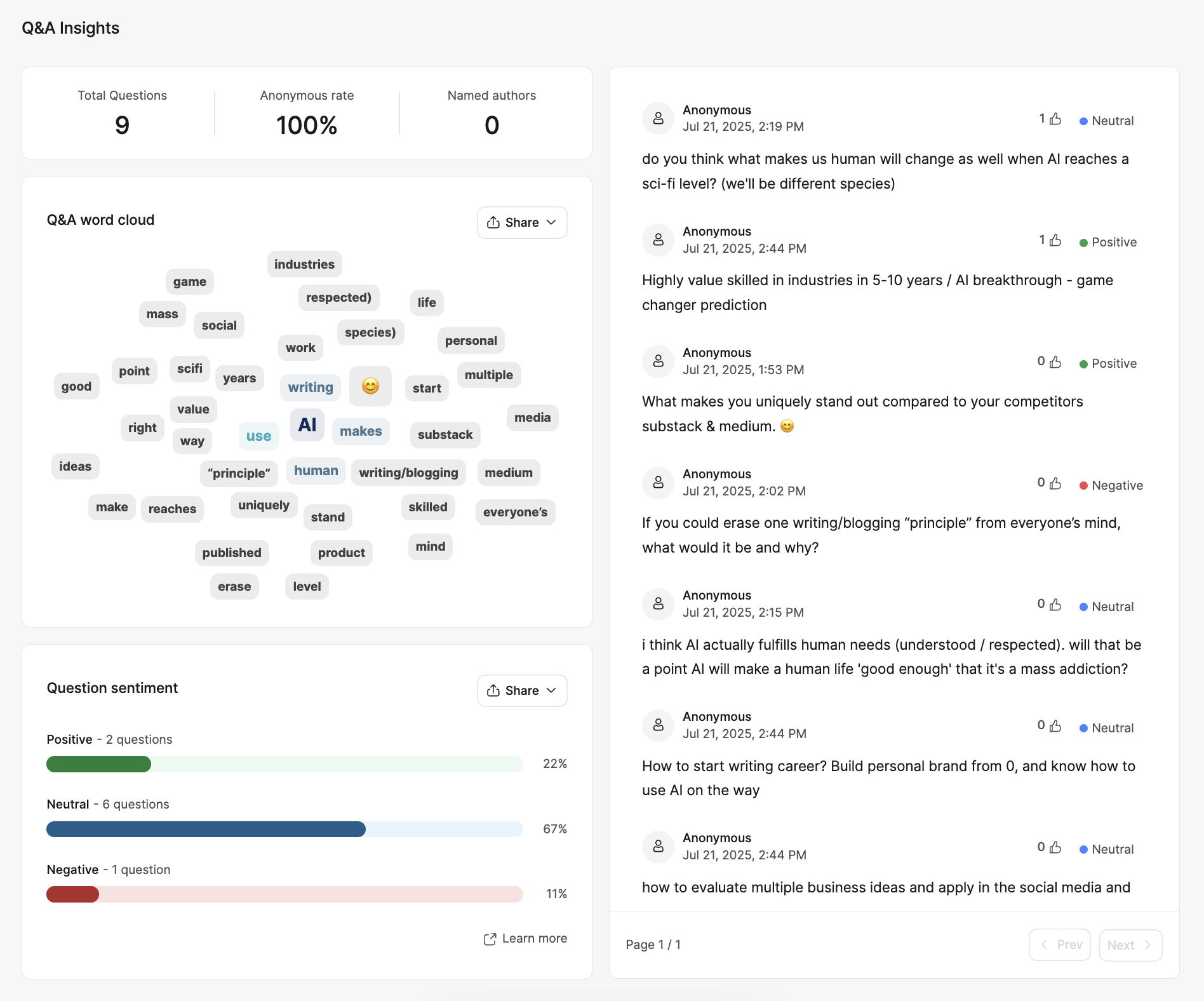
How do we avoid becoming emotionally “numb” or disconnected in an age where AI mimics emotional labor?
AI doesn’t create the problem of emotional disconnection, it only exacerbates it. I’d argue the current pandemic of social isolation and loneliness (girls being suicidal on instagram over body dysmorphia, and boys being suicidal on gaming & porn over nobody dating them except for the “waifus”, Japanese for AI girlfriends ) are the original sins of the web2 version of the internet. As a parent of 3 young children, I come at it from the perspectives of the no phones before 16 movement experts like Jonathan Haidt of the Anxious Generation. In sum, we have outsourced most of parenting to technology. Kids roam around freely with little guardrails online (while being overprotected offline). So no wonder why they feel depressed. To me, for my bias as a parent, all social ills could be solved by better parenting, especially when a child is young and able to absorb whatever comes at them. Disconnection happens, but if a child is nourished enough emotionally, they will be less likely to fall prey to something that feels human, but is not humans. They need to be able to tell what real connections feel like.
How does education change as AI’s ability to outperform humans on various tasks increases?
Pros is personalized tutoring. Every child is different and to me as an ex educator (in fact, that’s where I met Vicky, 12 years ago, as a gen 2 of the summer camp I started), the biggest problem with formal education is uniformity - every child is of the same age, same class, assumed to have the same needs. Children with dyslexia, ADHD, and other special needs are thrown to the sidelines. In fact, in most formal schools, boys perform significantly worse than girls, and now girls actually take the lead in higher education as well.
Cons, is the slow insidious and alarming erosion of original thinking. Everything is a copy of a copy of a copy. All that is left is AI slobs. There was a chronicle of higher of education study called is this the end of reading - where they surveyed college professors of the past 15 years. Not only do kids read less but they gain less ability to read/comprehend things. Troubling trends. Back to the outsourcing emotional labor thing again. This is actual mental labor of being able to think. The easier social life is, the less hard we work.
How do we avoid becoming incapable of critical thinking, by “delegating” our thought process?
New practice I do in the age of AI - is I always, always write my original copy myself, no matter how mundane, how hard, how imperfect. I do use AI to polish it but only after I put in an actual full fledge thought. This is why we still go to the gym despite the average white collar working not needing to lift heavy stuff like our ancestors any longer, and we cook despite the vast availability of food. Gym for the mind, as the say.
Can AI be used to enhance creativity instead of outsourcing it?
Yes absolutely! We use AI with our daughter on the app SUNO to create many songs and some of them are actually pretty good. I'm actually less worried about this point because humans will find ways to be creative and make arts no matter what. Any tools in a hand of a mediocre artist will not be as powerful as in a hand of a skilled artist. Case in point both me and my brother kien have iPhones, but when he takes a picture it looks like it’s straight out of a physical camera, when I take picture it looks like pictures of a mom who tries hard to capture the moments but is definitely not professional.
How does AI unlock you as a creator or business leader to do things you were previously unable to? How can it help unlock the audience?
A lot of my jobs such as connecting with my teams cannot be made better by AI - but here are some areas it has helped me:
- Researching - I listen to a lot of podcasts and read a ton of news/articles day-to-day, sometimes I cannot remember the exact details, especially when it comes to things that require accuracy like some stats. So I just type in the prompt to find the original source.
- Light editing - Perfecting what I already wrote in terms of tone, grammar, spelling, and for lack of better words, “vibes”. I recently launched a podcast with my daughter and since I'm unfamiliar with the length an apple podcast description vs. a spotty podcast description, I used AI to help tailor the length of the post to each of the medium I use.
- I started using it more now in place of search. Just reality. It can guess my intention faster than any actual google search.
How does AI shift your priorities as hiring managers?
TLDR to the audience: I think fear of job displacement is very real. But you need to keep the main thing the main thing (famously mentioned by Stephen Covey of the 7 habits book). For example, when I hire let’s say a developer at HackerNoon, I'm not just looking for somebody who can code (though that would be the main thing they do), I'm looking for people who solve problems, have low egos, and can iterate on the fly. This is also someone who I helped getting a heads up in their life, such as them buying their first house. So actual human connections are there. AI might be able to do a lot of his jobs well, but holistically I will still prefer to keep the guy. So as employees, your job is make your job irreplaceable by proving yourself valuable in as many functions of the business as possible. In other words, think like a founder. And using First Principles thinking, as in, going deeper and deeper until you get to the core of the problem. Keep the main thing the main thing.
Do you think what makes us human will change as well when AI reaches a sci-fi level? (we'll be different species)
No and Yes. I don't think our species will change in the deepest sense of the word. We will still have our core fundamental needs to connect, to touch, to have conflicts and repair, to be spontaneous. I don't think that will change. But it is a valid question: will AI achieve general intelligence (yes, it's coming), even consciousness, and some echos of those needs? Maybe. I think the reason a lot more people see this as a closer possibility now is because of LLM. A chatbot basically is a conversation, it is a mirror, a thing willing to "satisfy" you, reflect yourself back to you. That's not all what it is to be human, but a large part of it is.
Highly value skills in industries in 5-10 years / AI breakthrough - game changer prediction
My prediction is that there will be a devaluation of "white-collar" skills and appreciation of "blue-collar" skills. What AI is not good at right now, is anything in the 3D realm, physical realm, things that require touch. OpenAI started out as a robotics company, which failed and they pivoted it to LLM & chatbots. It is a very good time to learn physical skills, connections & movements, emotional regulations etc..
As for AI breakthrough, I'm still waiting for that promised medical research breakthrough (curing cancer, etc...) So far, still crickets.
If you could erase one writing/blogging “principle” from everyone’s mind, what would it be and why?
People tend to undervalue frequencies/showing up and overvalue audience validation. If you only care about the results, you will never be able to enjoy the process, or even write at all. Do it. Do it frequently. Do it regardless of how you think people will react. That is true for art & life as well.
How to start writing career? Build personal brand from 0, and know how to use AI on the way?
Glad you asked! HackerNoon is finally launching a blogging course specifically for the AI age. We will deep-dive into the difference between SEO (Search Engine Optimization) and GEO (Generative Engine Optimization). Watch this space for the launch date in a month or so: https://courses.hackernoon.com/
Is it right if you use AI in writing books, published articles?
Yes. Personally, I use the Pareto principle in most things, including writing (80% of the work is achieved in 20% of the time) I would always start with my original thinking first, no matter how rough and imperfect. Once I reached about 80% of the work, I use AI to polish it, saving myself the 80% of the time I would otherwise spend on things that will tangentially and not fundamentally improve my writing.
There are still more questions left unanswered - and that might warrant another event :-)
